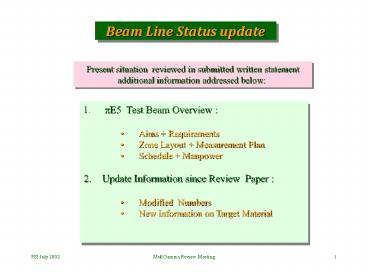Beam Line Status update - PowerPoint PPT Presentation
Title: Beam Line Status update
1
Beam Line Status update
Present situation reviewed in submitted written
statement additional information addressed below
- ?E5 Test Beam Overview
- Aims Requirements
- Zone Layout Measurement Plan
- Schedule Manpower
- Update Information since Review Paper
- Modified Numbers
- New Information on Target Material
2
Experimental Requirements Solutions
- Experimental Requirements
- Stop a high intensity surface muon beam in a
thin target - Minimum beam size at target (COBRA principle,
angular definition) - Minimum of contaminant beam e to reach the
detectors - Stopping material should pose a minimum of
influence on decay products
- Solutions
- Combined solution involving Degrader
separation via Energy-loss - (residual range matches target thickness,
?E difference for ? e - separation in following magnetic
elements) - WIEN Filter (crossed EB fields - mass
selector) to eliminate beam e - in combination with sub-surface ?beam
thin target or surface ?beam - degrader
3
?E5 July 2002 Test Beam Overview
- Aims
- Simulate full transport system up to COBRA
- Measurement of beam phase space at the entrance
to transport solenoid - (needed for design of solenoid)
- Measurement of phase space at the exit to the
transport solenoid - (needed for new simulation of beam up to target
in COBRA) - Measure muon stopping distribution width using
foils - Requirements
- Maximum muon stopping rate in 37 mg/cm2 thick
target (in beam direction) - want 110 8 ?s 1
- Minimum beam e contamination
- Beam spot size at target want ? X ? Y 5
mm
4
Experimental Setup Technique
CH2 RF spectrum Michel e and beam e
1mm Pill counter
5
Measurement Plan
3 Measurement Positions / Phases A, B, C
Position A (post QSE42) (i) Optimize focus
after QSE42 (ii) Measure ? beam e rates
spot sizes with pill scanner
(iii) 2mm CH2 measure Michel e rate
with NaI MWPC Check
Consistency of Rates (iv) Measure remaining
phase space parameters (divergencies)
with profile MWPC (v) Measure momentum
spectrum ( 23 32) Mev/c
Position B (post Seperator) (i) Optimize
focus at entrance solenoid (ii) Repeat A
(ii) (iv) rates phase space (iii)
Study ?-e separation
Position C (post Solenoid) (i) Optimize focus
after solenoid no collimator no
degrader (ii) Repeat A (ii) (iv) rates
phase space pill NaI 2mm CH2
(iii) 660 microns CH2 with foils measure
stop-distribution (iv) Repeat C(ii)
rates phase space (v) Study rate vs.
p-slits
6
Transport / Turtle
A ?X 40 mm ?Y 4 mm
B ?X 7 mm ?Y 12 mm
C ?X 4 mm ?Y 5 mm without degrader
7
Beam Time Schedule
Phase A
Phase
B
Phase C
8
Review Updated Numbers
Degrader Studies
Stop Distribution in CH2/Mylar/Kapton for ?P/P
6.4 FWHM Flat P0 28 MeV/c
Stop Distribution in CH2/Mylar/Kapton for ?P/P
5.6 FWHM Gaussian P0 28
MeV/c
? 0.95 g/cm3 Range to stop all 1350 microns
Degrader 950 microns Target 150 microns at
22 deg.
400 ?
? 1.39 g/cm3 Range to stop all 1050 microns
Degrader 750 microns Target 100 microns at
22 deg.
267 ?
P0 (28 /- 0.75 )MeV/c
9
Depolarizing Properties of CH2
PR 1958
For 100 Polarized ? ? 1/3 for CH2 ? 0.15
for B? 3.5 KG
100 Depolarization ? asymmetry a 0
case at ? 90 or Ee 26
MeV
In Experiment interested in
5 effect in CH2 for ? c.f. 100 depolarized
10
Target Beam Monitoring (ideas)
- Monitoring Questions solutions presently under
study - Target attached to drift chamber assembly
- possibility to exchange different targets
- survey of target position calibration with
ereconstruction of - target periphery (dedicated low rate runs)
- Muon normalization using scintillation
hodoscopes during data-taking - as well as proton monitor
- dedicated low-rate calibration runs for
hodoscopes with scintillator/diode - counters
11
Proposal Layout
After initial measurements , Z-branch proposed
but U-branch still had to be studied
12
U-Branch Degrader Measurements
Use Degrader Cleaning Stage Special Degrader
system needed location fixed by optics
Secondary Beam-blocker
13
Degrader Location
- Degrader System
- Degrader must be placed at a FOCUS ( divergence
max) - because of AST Magnet, - this is within Beam-Blocker
- Relatively complicated structure since it has to
be introduced into a Safety Element - ( Beam-Blocker) via the vacuum chamber of the
last fixed quadrupole doublet
Beam-Blocker Motor driven shaft rotates
massive cylinder with off-centre hole in
out of the beam axis. Our
Degrader must be positioned within this hole
14
Degrader System
Access through last Doublet QSE41/42 spectromete
r on rails to allow quick access without crane
CH2 collimator Degrader Foil
15
Experimental Setup
- Measurements made (Sept.- Oct. 2001)
- Total of 31 measurements
- 16 different Beam Tunes tried
- 2 different locations
- (post QSE42, post Spectrometer i.e. QSE44)
- 5 different detectors tried
- Beam Time Prematurely ended - main Beam Blocker
- defective repair shutdown 2002
16
Results
- Transmitted rates without
- degrader equivalent
- beam e rate 2.7 times higher
- in U-branch
- with spectrometer loss of
- factor 2.1 independent of
- condition
- with degrader unexpected
- loss of factor 5.5 before area
- (increased vertical divergence
- due to multiple scatt. QSE
- apertures r12.5cm , rest
- of beam line r 20cm.)
- Beam e suppression good
- High Michel background
- origin upstream of spect.
- (same characteristic as beam e)
Conclusion Cannot use Degrader at focus of AST
with small aperture
quadrupoles following ? Wien Filter
17
Momentum Spectrum
- Central Momentum 1.4 higher
- ???? 3.4 FWHM equivalent
- to momentum byte set
- drop-off to small P much steeper
- than P 3.5
- GEANT says P 3.5 should be
- valid down to 23 MeV/c
- subsequently
- All magnet power supplies checked
- For offset Linearity
- lt few per mille
? check by Tuning whole
beam line each time, not just
scaling































